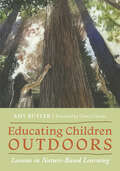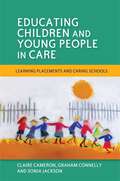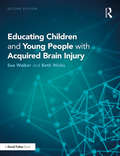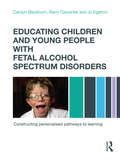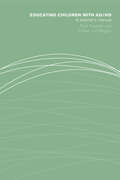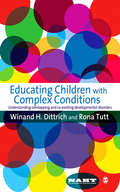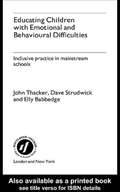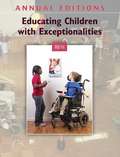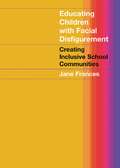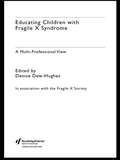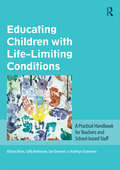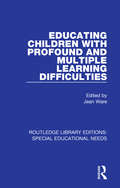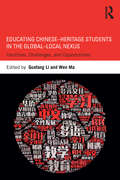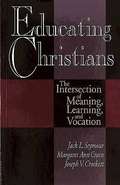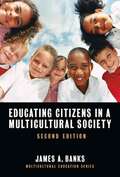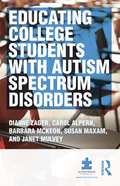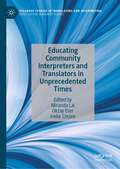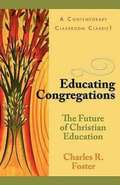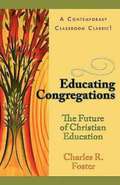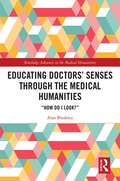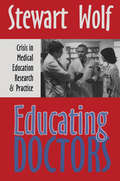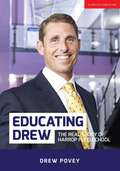- Table View
- List View
Educating Children Outdoors: Lessons in Nature-Based Learning
by Amy ButlerEducating Children Outdoors is a resource for educators interested in spending extended periods of time in nature with their students. Bringing over two decades of experience working outdoors with teachers and students, Amy Butler offers curricular guidance on nature-based lessons that align with K–12 education standards and build on the innate curiosity and wonder children have for the natural world. This book will help the educator:- Learn successful routines and practices to make learning outdoors safe and engaging- Understand protocols for real and risky play- Draw inspiration from real-life stories from other teachers about learning in nature- Meet NGSS and Common Core standards outdoors with seasonal lessons that are child-centered- Be part of the movement to support children in becoming reconnected with the natural world and the places they call homeWith twenty-five lessons in five units of study spread out across a seasonal school year and appendixes that offer templates for learning, Educating Children Outdoors is essential for educators looking to harvest the benefits of a nature-based curriculum.
Educating Children and Young People in Care: Learning Placements and Caring Schools
by Claire Cameron Graham Connelly Sonia JacksonChildren and young people in care rarely match the academic achievements of their peers and policy and procedures to address this inequality have not yet remedied the problem. Drawing on ideas from social pedagogy, the authors present a new approach - learning placements and caring schools. They show that education and care must be considered integral to both out of home placements and schools. Packed with practice examples, it includes chapters on early childhood education and care, as well as alternatives to school and higher education, covering everything from birth up to the age of 25. It highlights the potential benefits of a range of learning opportunities, from drama and outdoor activities, to bedtime stories and mentoring as well as providing support for teachers in their role as carer. Chapters include key points, case studies, practice points and useful resources. This is a unique evidence-informed practical guide for students and professionals in the fields of social work, social care, psychology and education.
Educating Children and Young People with Acquired Brain Injury
by Sue Walker Beth WicksEducating Children with Acquired Brain Injury is an authoritative resource book on the effects of brain injury on young people and how educators can understand and support their needs. This new edition has been updated to reflect changes to legislation and practice relating to special educational needs and will enable you to maximise the learning opportunities for young people with acquired brain injury (ABI). Considering key areas in special educational needs such as communication, interaction, cognition, sensory and physical needs, the book provides information on the multifaceted needs of children and young people with ABI and how these needs can be met. This book will help you to: Understand the difficulties that young people with ABI experience Support these students by using appropriate strategies to help their learning Understand and address the social and emotional difficulties experienced by these students Work in partnership with families and other professionals Understand information from other professionals by reference to a glossary of terms Access further useful information from relevant resources and organisations Written for SENCOs, teachers, teaching assistants, educational psychologists and other education professionals across all settings, Educating Children with Acquired Brain Injury is full of useful information and advice for parents and other family members, clinical and behavioural psychologists, therapists and support workers involved with children and young people with ABI.
Educating Children and Young People with Fetal Alcohol Spectrum Disorders: Constructing Personalised Pathways to Learning
by Barry Carpenter Jo Egerton Carolyn BlackburnThe range of learning difficulties associated with children who have fetal alcohol spectrum disorders (FASDs) has been highlighted as an emerging but little understood area of Special Educational Needs. This engaging, timely, and highly practical book will raise awareness about FASDs and their associated difficulties across the entire education workforce. It provides a range of specialist, practical tried-and-tested teaching and learning strategies, from which teachers and support staff may construct personalised learning plans for students with FASDs, and will help improve outcomes for all their children. It also: explains the impact that FASDs can have on the child’s brain; discusses the overlapping and co-existing disorders, such as ADHD and autism spectrum disorders; shows how to support and empower teachers; provides ready-to-use teaching resources and strategies that can be used directly in the classroom. Informed by the very latest research and written by leading experts in the field, Educating Children and Young People with Fetal Alcohol Spectrum Disorders will prove invaluable for experienced teachers and teaching assistants who are engaging in Continuing Professional Development, as well as newly qualified and training Initial Teacher Training students.
Educating Children in Poor Countries
by Arye L. Hillman Eva JenknerIn an ideal world, primary education would be universal and publicly financed, and all children would be able to attend school regardless of their parents' ability or willingness to pay. In many poor countries, however, governments lack either the financial resources or the political will to provide each child with a basic education, despite the benefits that would accrue not only to individuals but to society as a whole. In some of these countries, parents cover part or all of the cost of their children's education. This paper explores the pros and cons of user payments.
Educating Children with AD/HD: A Teacher's Manual
by Paul Cooper Fintan O'ReganAttention Deficit/Hyperactivity Disorder (AD/HD) is the most common behavioural disorder affecting up to five per cent of children in the UK. This book provides a concise and comprehensive guide to educating children with AD/HD, offering a theoretical introduction to the disorder, and practical guidance for the classroom teacher on how to support children with this condition. This practical guide is divided into three clear sections which focus on: * the nature of AD/HD and its impact on the individual in school, as well as the ways in which it can be most accurately diagnosed* the principles and practices of intervention, including specific educational interventions and behaviour management techniques* a series of case studies illustrating the nature of AD/HD and its relationship with other difficulties making suggestions for school-based interventions. Rooted in the experiences of practitioners who work with children with AD/HD every day, this book draws on up-to-date research evidence to challenge crude assumptions about AD/HD and argue that the best way to understand it is as a condition in which biological and environmental factors interact.
Educating Children with Complex Conditions: Understanding Overlapping & Co-existing Developmental Disorders
by Dr Rona Tutt Dr Winand H Dittrich'This is an important contribution to the field of SEN. By putting the child into a context, the authors recognize that each child is unique and cannot be reduced to a simple diagnosis. Highly recommended' - SEN Magazine 'In just over 100 pages this book gives the clearest account I have yet read of 'overlapping and co-existing conditions'....All professionals working with children with complex conditions will find it both interesting and practical' - Special 'The book is written in an easily digestible form, and provides insight into overlapping conditions as well as advice on support to those working to meeting the needs of pupils with these complex disorders' - SNIP 'Many have tried but few have succeeded in bringing together the varying threads of special educational needs into a concise and proactive format. I know, having tried and failed myself. Here at last Dittrich and Tutt have created a fascinating account of the current SEN world and have succeeded, in my opinion, in demystifying and explaining the significance of specific SEN terms, while illustrating that overlap is more the norm than the exception. Well researched and written with both clarity and experience, the authors stress that there really is no such thing as a SEN child, but that some children are in essence more interesting in their learning and behaviour style than others.' Fintan O'Regan, Author and Consultant There are growing numbers of children displaying the symptoms of more than one condition or disorder, and this has led to those involved in education needing to understand which conditions commonly overlap or co-exist, and how to meet children's more complex needs. By bringing together some of the latest research on how the brain learns with what is known about identifying developmental disorders that appear to have a common biological basis, this book covers: - what is known about a common group of disorders, (including ADHD, autistic spectrum disorders, dyslexia, dyscalculia and dyspraxia) - how to recognise when a child may have more than one condition - what teaching approaches and strategies might be most relevant Written in a non-technical style, the book blends together scientific knowledge from different disciplines and translates it into practical terms for school leaders, practitioners in the field of special educational needs and disabilities, and students following courses in higher education.
Educating Children with Emotional and Behavioural Difficulties: Inclusive Practice in Mainstream Schools
by Elly Babbedge David Strudwick John ThackerEducating Children with Emotional and Behavioural Difficulties shows that it is possible for schools to provide inclusive education for children with social and emotional difficulties without jeopardising the well-being and progression of the children or compromising the academic standing of the school. Using a case-study approach, the importance of school leadership, organisational culture and classroom strategies for working with troubled individuals and their families is also emphasised. The authors also draw attention to the fact that teachers need to recognise and take account of the effect of the neighbourhood, family, educational history and their own viewpoints on a young child's emotional and social development.
Educating Children with Exceptionalities 10/11 (20th edition)
by Karen L. FreibergThe Annual Editions series provides students with convenient, inexpensive access to current, carefully selected articles from the public press. Annual Editions: Educating Children with Exceptionalities 10/11 is an easy-to-use reader that presents articles on important topics such as fitting in, severe disabilities, gifted and talented, and many more.
Educating Children with Facial Disfigurement: Creating Inclusive School Communities
by Jane FrancesChildren and young people who are visibly different face significant social and psychological challenges at school. Educating Children with Facial Disfigurement demystifies a difficult and delicate subject. Teachers and others working in education can use this book to acquire a better knowledge of the issues involved, as well as the confidence to handle sensitive issues and foster inclusive attitudes both in and out of the classroom. There are many causes of facial disfigurement - birthmarks, cleft lip and palate, burns, scars and serious skin conditions - so it is essential that all schools know about the issues arising from visible difference. Jane Francis examines many of these issues and demonstrates in a practical way how to deal with: * staring, curiosity and questions, teasing, name-calling and bullying* medical needs, special educational needs and related issues* creating inclusive school communities* self-perception and self-expression* career ideas, work experience and social skills for life. With illustrative case studies, lesson ideas and references to useful resources, this book will be of particular relevance to teachers with responsibility for special educational needs or pastoral care.
Educating Children with Fragile X Syndrome: A Multi-Professional View
by Denise Dew-HughesWhat is Fragile X? The most common inherited cause of learning difficulties, affecting a child's ability to tackle key areas such as literacy and numeracy, and causing behaviour problems and social anxiety. What can teachers do to help children with Fragile X become more effective learners? This definitive text will provide essential support and information for teachers with the expertise of an international field of researchers, whose variety of perspectives contribute to a unique, multi-professional approach. Each chapter of the book suggests practical intervention strategies, based on sound educational principles expressed in clear non-specific terms. A range of important topics are considered, including: * the physical and behavioural characteristics of Fragile X* the effects of Fragile X on learning* medication and therapy* related conditions such as autism and attention deficit disorders. Breaking down the barriers of professional practice, this book establishes the groundwork for successful and valuable multi-professional teamwork. By providing immediate access to a body of empirical knowledge and advice from other disciplines, it will encourage teachers to incorporate this approach into their own practice. Everyone responsible for the education of a child with Fragile X syndrome should read this book.
Educating Children with Life-Limiting Conditions: A Practical Handbook for Teachers and School-based Staff
by Sally Robinson Alison Ekins Ian Durrant Kathryn SummersEducating Children with Life-Limiting Conditions supports teachers who are working with children with life-limiting or life-threatening conditions in mainstream schools by providing them with the core knowledge and skills that underpin effective practice within a whole-school and cross-agency approach. Mainstream schools now include increasing numbers of children with life-limiting or life-threatening conditions, and this accessible book is written by a team comprised of both education and health professionals, helping to bridge the gap between different services. Recognising the complexity of individual cases, the authors communicate key principles relating to the importance of communication, multi-professional understanding and working and proactive planning for meeting the needs of any child with a life-limiting or life-threatening condition that can be applied to a range of situations. Reflective activities and practical resources are provided and are also available to download. This book will be of interest to teachers in mainstream schools, as well as teachers, SENCOs and senior leaders in all school settings, school nurses, children’s nurses and allied health professionals.
Educating Children with Profound and Multiple Learning Difficulties (Routledge Library Editions: Special Educational Needs #60)
by Jean WareFirst published in 1994. The authors of this book aim to make recent developments in psychological research accessible to teachers of pupils with profound and multiple learning difficulties. The authors present their own and related research in the areas of assessment, curriculum, and teaching techniques, taking care to point out the range, relevance and limitations of findings in the context of pupils with PMLDs. As this is an area of acute training need, the book will meet a real need for a broad current perspective on good practice. The needs of pupils at primary and secondary levels are considered and case studies are used to exemplify some of the challenges and approaches discussed.
Educating China
by Peter Zarrow"In this major study, Peter Zarrow examines how textbooks published for the Chinese school system played a major role in shaping new social, cultural, and political trends, the ways in which schools conveyed traditional and 'new style' knowledge and how they sought to socialize students in a rapidly changing society in the first decades of the twentieth century. Focusing on language, morality and civics, history, and geography, Zarrow shows that textbooks were quick to reflect the changing views of Chinese elites during this period. Officials and educators wanted children to understand the physical and human worlds, including the evolution of society, the institutions of the economy, and the foundations of the nation-state. Through textbooks, Chinese elites sought ways to link these abstractions to the concrete lives of children, conveying a variety of interpretations of enlightenment, citizenship, and nationalism that would shape a generation as modern citizens of a new China"--Page 4 of cover.
Educating Chinese–Heritage Students in the Global–Local Nexus: Identities, Challenges, and Opportunities
by Guofang Li Wen MaWeaving together a richly diverse range of student voices, perspectives, and insights, this collection of studies from around the world offers the educational community a better understanding of K-12 and adult Chinese–heritage students’ languages, cultures, identities, motivations, achievements, and challenges in various cross-cultural settings outside North America. Specifically, it addresses these overarching questions: What are Chinese–heritage students’ experiences in language and education in and outside schools? How do they make sense of their multiple ethnic and sociocultural identities? What unique educational challenges and difficulties do they encounter as they acculturate, socialize, and integrate in their host country? What are their common struggles and coping strategies? What are the instructional practices that work for these learners in their specific contexts? What educational implications can be drawn to inform their teachers, fellow students, parents, and their educational communities in a global context? Individual chapters employ different theoretical frameworks and methodological instruments to wrestle with these questions and critical issues faced by Chinese–heritage learners.
Educating Christians: The Intersection of Meaning, Learning, and Vocation
by Jack L. Seymour Margaret Ann Crain Joseph V. CrockettIn this introductory treatment of Christian education, the authors assume that "religious education begins with the basic human need to make meaning. The church and its education fail when they do not take into account people's life experiences and their search for faithfulness. " Teachers and pastors learn first to understand how their own meanings have been shaped, then to name and clarify how religious meaning is transmitted and transformed through personal experience. Several personal and congregational "stories" are woven throughout the text to help the reader better understand how meaning, learning, and vocation converge as Christians grow in faith and understanding. Readers are encouraged to apply new insights to their own lives through activities that are suggested throughout the text. A Key Concept Index provides easy access to primary terms and ideas.
Educating Citizens in a Multicultural Society
by James A. BanksIn this second edition of Educating Citizens in a Multicultural Society― which includes three new chapters―Banks argues that an effective citizenship education helps students to acquire the knowledge, skills, and values needed to function effectively within their cultural communities, nation states, regions, and the global community. <p><p>It also helps students to acquire cosmopolitan perspectives and values needed to attain equality and social justice for people around the world. In the new chapters, Banks draws heavily upon his recent work which focuses on how students in multicultural nations around the world can be educated in ways that will help them to develop the knowledge, attitudes, and values needed to make decisions and to take action to create a more just and humane world.
Educating College Students with Autism Spectrum Disorders
by Dianne Zager Carol S Alpern Barbara McKeon Janet D Mulvey Sue MaxamEducating College Students with Autism Spectrum Disorders is one of the first books to specifically address the accommodation of students with significant learning differences in postsecondary education. Developed with the support of Autism Speaks, and piloted at Pace University, each component of this book is scientifically-based and provides a model of emerging best practices for college instruction involving students with ASD. The text is designed to give college faculty a deep understanding of students with ASD and help faculty to productively engage students with ASD, while also meeting the needs of all students in their classes. The strategies included in the manual are solidly grounded in principles of universal design and will prove indispensible for teaching college students of varying ability levels and diverse learning styles. A companion video shows clips of students and educators that are engaged in inclusive practices to illustrate approaches that have been successful in dealing with challenging situations in the classroom.
Educating Community Interpreters and Translators in Unprecedented Times (Palgrave Studies in Translating and Interpreting)
by Miranda Lai Oktay Eser Ineke CrezeeThis edited book features contributions from interpreter and translator educators globally, in which they discuss changes to teaching, assessment and practice as a result of the COVID-19 pandemic. The chapters provide a comprehensive picture of educators’ responses to challenges and opportunities. The book will be of interest to students, researchers and educators, as well as government language policymakers and stakeholders of translation and interpreting agencies.
Educating Congregations: The Future of Christian Education
by Charles FosterDescribes how to effectively educate congregations.
Educating Congregations: The Future of Christian Education
by Charles R. FosterA leading Christian educator offers a practical guide for revisioning a church's educational program. After identifying the weaknesses in current education programs, Charles Foster offers an alternative vision that is more cooperative, more attentive to the whole of the congregation's life, and that helps people critically correlate the Bible and Christian tradition to their own experience.
Educating Doctors' Senses Through The Medical Humanities: "How Do I Look?" (Routledge Advances In The Medical Humanities Ser.)
by Alan BleakleyEducating Doctors’ Senses Through the Medical Humanities: “How Do I Look?” uses the medical diagnostic method to identify a chronic symptom in medical culture: the unintentional production of insensibility through compulsory mis-education. This book identifies the symptom and its origins and offers an intervention: deliberate and planned education of sensibility through the introduction of medical humanities to the core undergraduate medicine and surgery curriculum. To change medical culture is an enormous challenge, and this book sets out how to do this by answering the following questions: How has a compulsory mis-education for insensibility developed in medical culture and medical education? How is sensibility capital generated, who ‘owns’ it and how is it distributed, mal-distributed and re-distributed? What is the place of resistance (or ‘dissensus’) in this process? How can the symptom of a ‘developed’ insensibility be addressed pedagogically through introduction of the medical humanities as core and integrated curriculum provision? How can both the identity constructions of doctors and doctor–patient relationships be tied up with education for sensibility? How can artists work with clinicians, through the medical humanities in medical education, to better educate sensibility? The book will be of interest to all medical educators and clinicians, including those health and social care professionals outside of medicine who work with doctors.
Educating Doctors: Crisis in Medical Education, Research and Practice
by Stewart WolfAt a time when medical care for the people of the United States is undergoing wrenching change due mainly to vast and costly technological progress, doctors have had to cede much of their initiative and responsibility to third parties. Medicine has become a commercial enterprise. Patients must affiliate themselves with a managed health care organization in order to have access to their doctors. In the hurly-burly of today's techno-medicine, many physicians are too busy to spend time in dialogue with their patients. As a consequence, social and emotional circumstances that have been thoroughly documented to affect physiology and susceptibility to disease are overlooked.Stewart Wolf here critiques the medical establishment and the way those concerned with its various responsibilities discharge them. He puts medicine's responsibilities to society into historical perspective, relating it to social changes. He begins with the ways medical candidates are selected. He continues with commentary on currently designed teaching and learning, the qualities required in a physician and in a medical scientist, and the nature and challenges of disease and what can be done about them. Finally, Wolf provides a useful way of thinking about human biology, to better understand why people become sick or well and what people have to contend with to stay well. Throughout he emphasizes the role of the brain in controlling behavior of all sorts, general and visceral.Wolf emphasizes the regulatory power of the nervous system as it perceives and evaluates life experiences and influences learning, behavior, and susceptibility to disease. Wolf'sgoal is not to supply a recipe for the achievement of better health, but to encourage a better understanding of ourselves and the paths toward health. Educating Doctors reexamines the responsibilities, goals, and activities of the medical establishment. As such it is a must read for policymakers, sociologists, and professionals working in the medical field.
Educating Drew: The Real Story Of Harrop Fold School
by Drew PoveyTelling the remarkable story of Harrop Fold School in Salford, from their unprecedented GBP2.5m debt to being featured in the BAFTA-award nominated Educating Manchester TV series. Drew Povey was one of the youngest Heads in the country when he was appointed aged 32 in 2010. Through sheer determination and strong, visionary leadership, Drew and his management team (including his two brothers) have wiped out the GBP600k a year deficit and are reducing the huge debt - while continuing to get standout results from pupils. Their book reveals the untold story of their struggles, and the unique leadership style that has seen a quite stunning turnaround in a school once labelled one of the worst in the country.
Educating Drew: The Real Story Of Harrop Fold School
by Drew PoveyTelling the remarkable story of Harrop Fold School in Salford, from their unprecedented GBP2.5m debt to being featured in the BAFTA-award nominated Educating Manchester TV series. Drew Povey was one of the youngest Heads in the country when he was appointed aged 32 in 2010. Through sheer determination and strong, visionary leadership, Drew and his management team (including his two brothers) have wiped out the GBP600k a year deficit and are reducing the huge debt - while continuing to get standout results from pupils. Their book reveals the untold story of their struggles, and the unique leadership style that has seen a quite stunning turnaround in a school once labelled one of the worst in the country.
